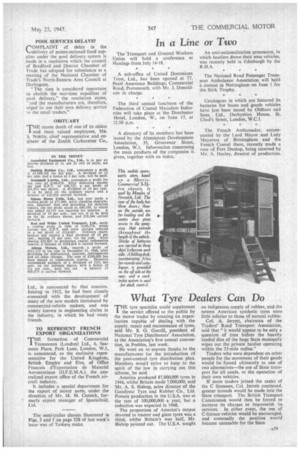What Tyre Dealers Can Do T HE tyre specialist could supplement
Page 31

If you've noticed an error in this article please click here to report it so we can fix it.
the service offered to the public by the motor trader by creating an organization capable of dealing with the supply, repair and maintenance of tyres, said Mr. S. G. Gorrill, president of National Tyre Distributors' Association, at the Association's first annual convention, in Peebles, last week.
He went on to express thanks to the manufacturers tot the introduction of the post-control tyre distribution plan. Members would strive to keep to the spirit of the law in carrying out this scheme, he said.
America produced 87,000,000 tyres in 1946, whilst Britain made 7,000,009, said Mr. A. S. Bishop, sales director of the Goodyear Tyre and Rubber Co., Ltd. Present production in the U.S.A. was at the rate of 100,000,000 a year, but a reduction was expected in 1948.
The proportion of America's output devoted to tractor and giant tyres was a third, whilst Britain's was half, Mr. Bishop pointed out. The U.S.A. sought an indigenous supply of rubber, and the newest American synthetic tyres were little inferior to those of natural rubber.
Col. A. Jerrett, chairman of the Traders' Road Transport Association, said that " it would appear to be only a question of time before the heavily loaded dice of the huge State monopoly wipes out the private haulier operating within the 25-mile radius."
Traders who were dependent on other people for the movement of their goods would be forced ultimately to one of two alternatives—the use of State transport for all needs, or the operation of their own vehicles.
If more traders joined the ranks of the C licensees, Col. Jerrett continued, greater inroads would be made into the State transport. The British Transport Commission would then be forced to increase its charges or impoverish its services. In either event, the use of C-licence vehicles would be encouraged, and eventually the position would become untenable for the State.












































































